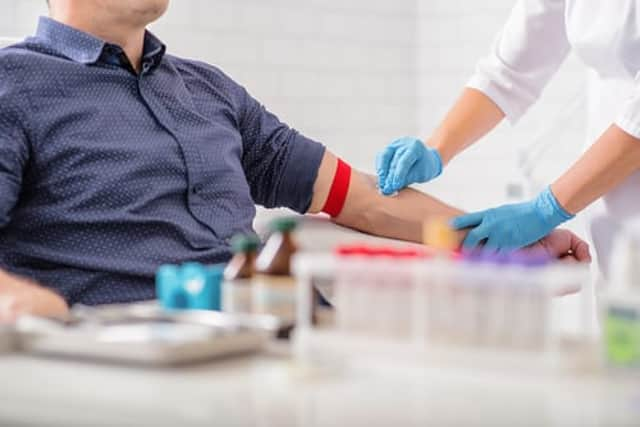How to register as a blood stem cell donor - as sign-ups drop during Covid pandemic


Blood disease charity DKMS is urging people to register as blood stem cell donors after sign-ups to donate have reduced during the Covid pandemic.
DKMS believes that increased nervousness about visiting hospitals during the pandemic has meant fewer stem cell donor registrations, as well as fewer visits to the GP for people with cancer symptoms.
Advertisement
Hide AdAdvertisement
Hide AdReshna Radiven, head of communications and engagement at DKMS, said: “There is a 20 per cent drop in the number of people who are registering when looking at figures year on year, and unfortunately this year we have seen quite a dramatic drop again.
“Just in March alone we have only registered about 20 per cent of the people we would want to register, and we fear that that is going to continue so we could end up in a situation where we have only registered half of the people that we would expect to register in a given year.”
DKMS is particularly encouraging young men to register, as those aged 18 to 30 are the most likely to ensure a successful transplant. This is because they can produce the highest number of stem cells.
But what is blood stem cell donation and how can people sign up?
Here’s what you need to know.
What is blood stem cell donation?
Advertisement
Hide AdAdvertisement
Hide AdStem cells can grow into any other cell in your body, which means they can be used to treat a wide range of blood cancers and disorders.
DKMS explains that for many of those diagnosed with blood cancer, “their only chance of survival is to find a matching blood stem cell donor, as fast as possible.”
According to Blood Cancer UK, a stem cell transplant can be a treatment for some blood cancers “because it involves destroying the abnormal stem cells that are producing cancerous blood cells, and giving your body new, healthy stem cells that can make healthy blood cells again.”
Before a stem cell transplant can take place, the person receiving the transplant will need intensive high-dose chemotherapy, and possibly radiotherapy, to destroy the cells in their bone marrow.
Advertisement
Hide AdAdvertisement
Hide AdA stem cell transplant is also used to replace your stem cells if you need high doses of chemotherapy to treat your blood cancer, as it can damage your bone marrow and stem cells.
For those donating their blood stem cells, a nurse will visit you at home or work to inject you with a drug which vastly increases the number of stem cells in your circulating blood for the four days prior to your donation.
On the fifth day, you will be connected to a cell-separator machine, without the need for a general anaesthetic.
The machine collects the stem cells from your blood via a vein in one arm, returning the blood to your body through a vein in your other arm.
How can I sign up to donate my blood stem cells?
Advertisement
Hide AdAdvertisement
Hide AdDKMS explains three easy steps you can take to sign up to donate your blood stem cells.
Firstly, you will need to order a swab kit online. You will be required to answer a few simple questions about yourself to make sure you’ll be able to safely donate if needed.
If it’s a yes, then you’ll be directed to a page where you can request your swab kit online.
Secondly, you will be required to swab the inside of your cheeks and send the swabs back. These will then be analysed in a lab to determine your tissue characteristics, which is how donors are matched to patients.
Once your samples have been analysed, you will then be added to the register and you will be available for patients all around the world who are searching for a donor.